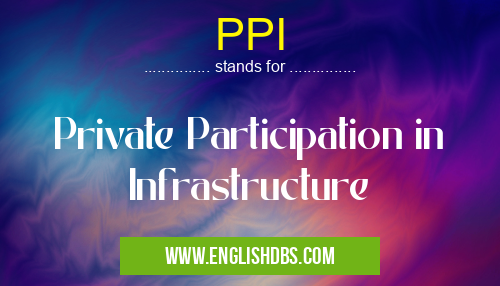What does PPI mean in UNCLASSIFIED
PPI, or Private Participation in Infrastructure, refers to private-sector involvement in infrastructure development and the provision of services related to it. This type of investment involves both the public and private sectors working together for the collective benefit of their economies.

PPI meaning in Unclassified in Miscellaneous
PPI mostly used in an acronym Unclassified in Category Miscellaneous that means Private Participation in Infrastructure
Shorthand: PPI,
Full Form: Private Participation in Infrastructure
For more information of "Private Participation in Infrastructure", see the section below.
Essential Questions and Answers on Private Participation in Infrastructure in "MISCELLANEOUS»UNFILED"
What is PPI?
PPI, or Private Participation in Infrastructure, refers to private-sector involvement in infrastructure development and the provision of services related to it.
How does PPI work?
PPI typically involves a contractual arrangement between a government agency and a private entity that involves investment into infrastructure projects such as roads, bridges, ports and power plants. The government provides policy guidelines or regulations regarding how these investments should be managed while the private-sector entity invests capital into the project.
What are some benefits of PPI?
Private investments can help governments reduce costs by allowing them access to capital that they would not otherwise have access to. Additionally, public-private partnerships can improve efficiency by allowing each sector to specialize in its strengths; for instance, governments excel at setting policies while businesses often specialize in providing goods and services quickly and efficiently.
Are there any risks associated with PPI?
As with any form of investment, there are inherent risks associated with investing in infrastructure projects through public-private partnerships. These risks include financial risk (e.g., cost overruns), political risk (e.g., changes in government policies), operational risk (e.g., delays or disruptions caused by poor management) among other potential issues.
Is PPI common practice?
Yes, an increasing number of governments around the world are using public-private partnerships as a way to finance and develop infrastructure projects due to their many benefits such as cost savings and improved efficiency over traditional methods of development such as taxation or outright nationalization of assets.
Final Words:
By involving both public and private entities in infrastructure development projects, governments can ensure that these investments become successful while also creating positive externalities such as job creation and increased economic activity for their communities. Through this collaborative approach to investment known as PPI, both parties can often times achieve greater success than if each acted alone.
PPI also stands for: |
|
| All stands for PPI |
